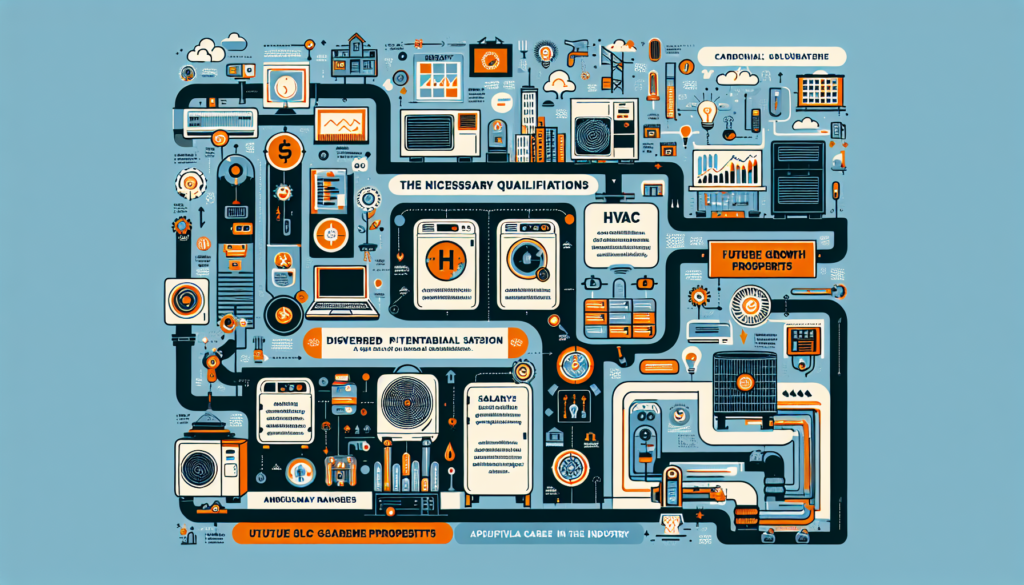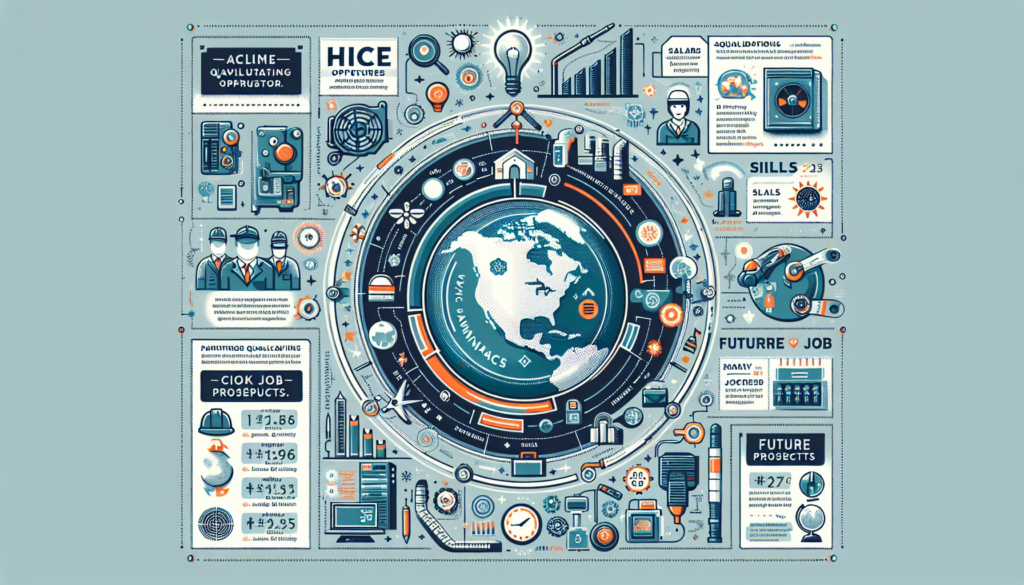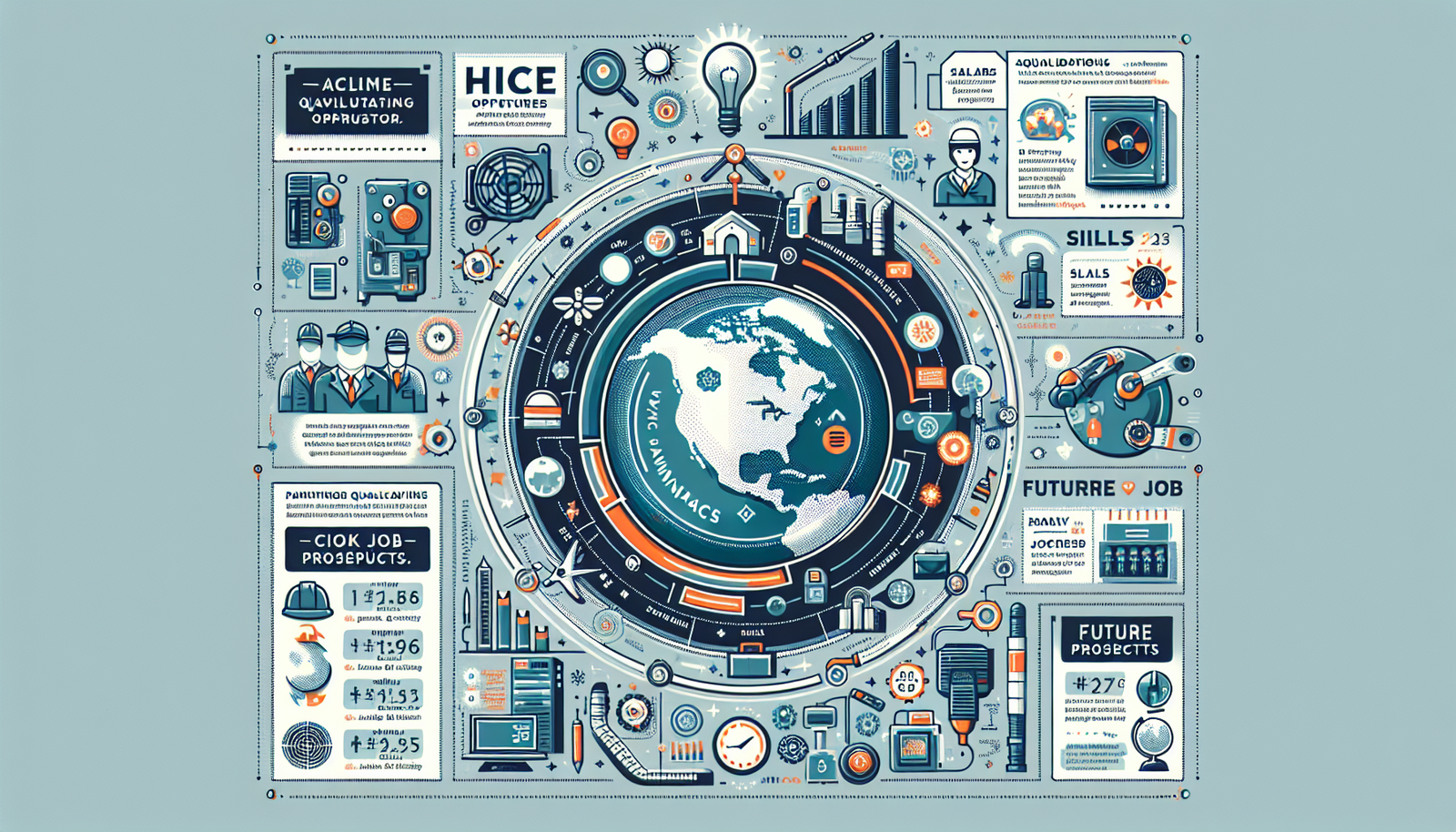Looking to embark on a rewarding career in the field of HVAC? Look no further! This article will take you on a journey through the world of HVAC job opportunities, presenting you with a wide range of exciting options to explore. Whether you aspire to become an HVAC technician, installer, or service manager, this article will provide you with valuable insights into the various paths you can take to thrive in this dynamic industry. So fasten your seatbelt, and get ready to discover the countless possibilities awaiting you in the world of HVAC job opportunities.
Overview of HVAC Industry
1.1 Introduction to HVAC
HVAC, which stands for Heating, Ventilation, and Air Conditioning, is an industry that revolves around the design, installation, and maintenance of systems that provide comfort and regulate the air quality in indoor spaces. HVAC systems play a crucial role in various sectors, including residential, commercial, and industrial, ensuring optimal temperature, humidity, and air circulation.
1.2 Importance of HVAC in various sectors
The importance of HVAC cannot be overstated in various sectors, as it directly impacts the comfort, health, and productivity of individuals. In the residential sector, HVAC systems create a comfortable living environment and improve indoor air quality, promoting a healthy lifestyle. In the commercial sector, HVAC systems maintain ideal conditions for employees and customers, leading to increased productivity and customer satisfaction. Furthermore, in the industrial sector, HVAC systems ensure the longevity of machinery and equipment by regulating temperature and humidity levels.
1.3 Growth prospects in the HVAC industry
The HVAC industry offers promising growth prospects, driven by factors such as an increasing focus on energy efficiency, rising demand for indoor air quality management, technological advancements, and the growing adoption of renewable energy sources. With the increasing awareness and regulations emphasizing energy efficiency and sustainable practices, the demand for HVAC professionals is expected to rise significantly in the coming years.
Different HVAC Job Roles
2.1 HVAC Technician
An HVAC Technician is responsible for the installation, repair, and maintenance of HVAC systems. They diagnose and troubleshoot issues, perform regular maintenance tasks, and ensure that systems are operating efficiently. HVAC Technicians require a strong understanding of HVAC systems, electrical components, and refrigerants. They often work in residential, commercial, or industrial settings, addressing customer needs and ensuring optimal system performance.
2.2 HVAC Engineer
HVAC Engineers are involved in the design and development of HVAC systems. They utilize their expertise in mechanical engineering to create efficient and sustainable systems that meet clients’ requirements and comply with industry standards. HVAC Engineers may work on projects ranging from residential buildings to large commercial complexes or industrial facilities. Their responsibilities include system design, equipment selection, conducting load calculations, and ensuring compliance with regulations.
2.3 HVAC Sales Representative
An HVAC Sales Representative plays a vital role in the industry by promoting and selling HVAC products and services to potential clients. They establish and maintain relationships with customers, provide product demonstrations, and offer technical expertise. HVAC Sales Representatives have a deep understanding of HVAC systems and are skilled in explaining the benefits and features of various products. Their goal is to meet clients’ needs while driving sales growth for their company.
2.4 HVAC Project Manager
An HVAC Project Manager oversees the execution of HVAC projects from conception to completion. They coordinate with clients, engineers, technicians, and contractors to ensure that projects are delivered on time, within budget, and according to specifications. HVAC Project Managers handle project scheduling, budgeting, procurement, quality control, and site coordination. Effective communication, leadership, and project management skills are essential for success in this role.
2.5 HVAC Designer
HVAC Designers are responsible for creating detailed plans and specifications for HVAC systems. They work closely with engineers, architects, and other professionals to ensure that the system design meets the functional and aesthetic requirements of a building. HVAC Designers utilize computer-aided design (CAD) software to create 2D and 3D models, select equipment and components, size ductwork and piping, and ensure proper system integration.
2.6 HVAC Maintenance Technician
An HVAC Maintenance Technician specializes in the routine maintenance and inspection of HVAC systems to ensure their optimal performance and longevity. They perform regular tune-ups, cleanings, and inspections to identify and address potential issues before they escalate. HVAC Maintenance Technicians also troubleshoot and repair minor problems, replace worn-out components, and ensure that systems comply with safety and efficiency regulations.
Educational Requirements
3.1 Certifications and Licenses
While specific educational requirements may vary depending on the job role and employer, certifications and licenses are often essential in the HVAC industry. Common certifications include the Environmental Protection Agency (EPA) Certification, which demonstrates knowledge of handling refrigerants, and the North American Technician Excellence (NATE) Certification, which validates technical skills in HVAC installation, service, and maintenance.
3.2 Vocational Training Programs
Many aspiring HVAC professionals start their careers by enrolling in vocational training programs. These programs provide hands-on training in areas such as HVAC technology, electrical systems, refrigeration principles, and system troubleshooting. Vocational training programs typically last between six months to two years and equip students with practical skills necessary to enter the workforce.

3.3 Associate Degree in HVAC
An Associate Degree in HVAC provides a more comprehensive education and is often preferred by employers. This degree program covers a wide range of topics, including HVAC design, installation, repair, maintenance, electrical systems, and load calculations. It offers a deeper understanding of HVAC principles and prepares individuals for diverse job roles within the industry.
3.4 Bachelor’s Degree in Mechanical Engineering
For those aspiring to become HVAC Engineers or pursue higher-level positions, a Bachelor’s Degree in Mechanical Engineering is highly beneficial. This degree program focuses on the fundamentals of mechanical engineering, including thermodynamics, fluid mechanics, heat transfer, and HVAC system design. A bachelor’s degree provides a strong foundation in engineering principles and opens doors to more specialized roles in the HVAC industry.
Job Opportunities in Residential Sector
4.1 HVAC Installation and Repair
In the residential sector, there is a constant demand for HVAC professionals who can install and repair HVAC systems in homes. HVAC installation involves assessing the requirements of a residence, selecting suitable equipment, and ensuring proper installation. HVAC repair entails diagnosing and fixing issues with existing systems to restore their functionality. These job opportunities offer individuals the chance to work directly with homeowners and contribute to creating comfortable living environments.
4.2 HVAC System Design
Residential HVAC system design is another growing area in the industry. HVAC Designers in this sector create customized heating and cooling solutions for residential buildings, considering factors such as the size of the home, insulation levels, and energy efficiency goals. They design ductwork layouts, select appropriate equipment, and optimize system performance to meet homeowners’ specific needs while minimizing environmental impact.
4.3 Energy Efficiency Auditing
With the increasing emphasis on energy efficiency and sustainability, there is a rising demand for professionals who can conduct energy efficiency audits in residential properties. These audits involve assessing a home’s energy consumption, identifying inefficiencies, and recommending improvements to enhance energy efficiency. Professionals in this field help homeowners reduce their energy bills, improve indoor comfort, and contribute to a greener future by implementing energy-saving measures.
Job Opportunities in Commercial Sector
5.1 HVAC System Installation and Maintenance
The commercial sector offers a wide range of job opportunities in HVAC system installation and maintenance. HVAC Technicians and Installation Specialists work on large-scale projects, such as office buildings, hotels, schools, hospitals, and shopping centers. Their responsibilities include installing, repairing, and maintaining complex HVAC systems that cater to the unique requirements of commercial spaces. These job roles often involve collaborating with architects, engineers, and contractors to ensure the successful delivery of projects.
5.2 Building Automation and Controls
Building automation and controls have become integral to the design and operation of commercial buildings, and this has resulted in increased demand for professionals specializing in this field. HVAC professionals with expertise in building automation and controls work on systems that automate and regulate various aspects of a building, including temperature, lighting, ventilation, and security. They configure and maintain control systems, ensuring optimal building performance, energy efficiency, and occupant comfort.
5.3 Indoor Air Quality Management
Ensuring good indoor air quality has become a top priority in the commercial sector due to its direct impact on occupants’ health and well-being. HVAC professionals with expertise in indoor air quality management assess, improve, and monitor the quality of air in commercial buildings. They identify potential sources of pollutants, recommend appropriate filtration and ventilation systems, and implement strategies to maintain healthy indoor air quality levels. These professionals play a crucial role in creating safe and comfortable environments for employees, customers, and visitors.
Specialized HVAC Jobs
6.1 Refrigeration Technician
Refrigeration Technicians specialize in the installation, repair, and maintenance of refrigeration systems and equipment. These professionals work in various settings, including supermarkets, medical facilities, restaurants, and industrial plants. They are responsible for ensuring that refrigeration systems operate efficiently, maintain specific temperature requirements, and prevent food spoilage or damage to perishable goods. Refrigeration Technicians require in-depth knowledge of refrigerants, control systems, and electrical components.
6.2 HVAC Controls Technician
HVAC Controls Technicians focus on the installation, configuration, and maintenance of HVAC control systems. These systems regulate temperature, humidity, and airflow within a building. HVAC Controls Technicians work closely with engineers and technicians to integrate control systems into HVAC systems, program them for optimal performance, and troubleshoot any issues that arise. Their expertise in control systems ensures that HVAC systems operate efficiently and in accordance with set parameters.
6.3 HVAC Commissioning Engineer
HVAC Commissioning Engineers ensure that newly installed or upgraded HVAC systems operate as intended and meet the required standards. They conduct comprehensive tests, inspections, and adjustments to verify that systems are functioning optimally, energy-efficiently, and in accordance with design specifications. HVAC Commissioning Engineers play a critical role in optimizing system performance, minimizing energy waste, and ensuring customer satisfaction by delivering fully functional HVAC systems.

6.4 Energy Management Specialist
Energy Management Specialists focus on optimizing energy use within buildings by implementing energy-saving strategies and technologies. They analyze energy consumption patterns, identify areas for improvement, and propose energy efficiency measures. Energy Management Specialists may work closely with HVAC professionals to optimize HVAC system operation, integrate renewable energy sources, and implement energy management systems. Their expertise helps organizations reduce energy costs, minimize environmental impact, and achieve sustainability goals.
Skills and Qualities Required
7.1 Technical Skills
Working in the HVAC industry requires a strong foundation of technical skills. These skills include knowledge of HVAC systems, electrical components, refrigerants, control systems, and common troubleshooting techniques. Proficiency in tools and equipment used in HVAC installation, repair, and maintenance is also essential. Continuous learning and staying updated on industry advancements are crucial for maintaining technical competence in this rapidly evolving field.
7.2 Problem-solving abilities
HVAC professionals often encounter complex problems that require critical thinking and problem-solving abilities. They must be able to analyze issues, diagnose root causes, and develop effective solutions. Problem-solving skills are especially valuable for HVAC Technicians and Maintenance Technicians who encounter a wide range of equipment and system malfunctions in their day-to-day work.
7.3 Communication and Customer Service Skills
Strong communication and customer service skills are essential for HVAC professionals who interact directly with clients and stakeholders. HVAC sales representatives, project managers, and technicians must be able to communicate technical information effectively, address client concerns, and provide clear instructions. Excellent interpersonal skills are also crucial for building and maintaining positive relationships with customers.
7.4 Attention to Detail
Attention to detail is critical in the HVAC industry to ensure accurate installation, reliable repairs, and proper maintenance. HVAC professionals must pay close attention to specifications, safety regulations, and equipment warranties to avoid costly mistakes. Even small errors in system design or installation can have significant consequences, making attention to detail a key attribute for success.
7.5 Physical Stamina and Safety Awareness
The HVAC industry often involves physical work, requiring professionals to have physical stamina and endurance. HVAC Technicians and Maintenance Technicians may need to lift heavy equipment, crawl into tight spaces, and work in challenging environments. Safety awareness is also vital to minimize the risk of accidents, as HVAC professionals often work with electrical systems, refrigerants, and potentially hazardous equipment. Adhering to safety protocols and utilizing personal protective equipment is crucial for safeguarding oneself and others.
Salary and Career Growth
8.1 Median Salaries in Different Job Roles
Salaries in the HVAC industry can vary depending on factors such as job role, experience, location, and employer. According to the Bureau of Labor Statistics (BLS), the median annual wage for HVAC Technicians was $50,590 as of May 2020. HVAC Engineers often earn higher salaries, with a median annual wage of $87,370. Sales representatives, project managers, and other specialized roles may also have varying salary ranges based on their level of expertise and responsibilities.
8.2 Factors Influencing Salary Packages
Several factors influence salary packages in the HVAC industry. These factors include geographic location, as salaries may vary based on local demand and cost of living. Experience and educational qualifications also play a significant role, with more experienced and highly qualified professionals often commanding higher salaries. Additionally, job role, industry sector, and the size and reputation of the employer can also influence salary packages.
8.3 Career Advancement Opportunities in the HVAC Industry
The HVAC industry offers ample opportunities for career advancement and professional growth. HVAC professionals can enhance their skills and knowledge through continued education, certifications, and gaining experience in specialized areas such as energy management, building automation, or indoor air quality. Advancement to managerial or leadership roles is possible for those with strong technical expertise and excellent management skills. With the increasing demand for energy-efficient solutions and sustainable practices, the HVAC industry is continuously evolving, creating new career paths and opportunities for ambitious individuals.
Job Outlook and Demand
9.1 Rising Demand for Energy-Efficient HVAC Systems
As the world prioritizes energy efficiency and reduced environmental impact, the demand for energy-efficient HVAC systems is on the rise. HVAC professionals who can design, install, and maintain these systems are in high demand. The ability to optimize energy use, integrate renewable energy sources, and implement cutting-edge technologies makes HVAC professionals invaluable in promoting sustainability and meeting energy efficiency goals.
9.2 Growing Awareness of Indoor Air Quality
With the increasing awareness of the importance of healthy indoor environments, the demand for HVAC professionals specializing in indoor air quality management is growing. HVAC professionals who can assess and improve indoor air quality play a vital role in ensuring the well-being of occupants, particularly in commercial buildings, schools, hospitals, and other public spaces. The ability to implement effective ventilation, air filtration, and purification technologies is crucial to meet the expectations of clients and comply with regulations.
9.3 Technological Advancements in the HVAC Field
Technological advancements are transforming the HVAC industry, creating a need for professionals who can adapt to and implement these new technologies. The integration of smart devices, artificial intelligence, and internet of things (IoT) capabilities into HVAC systems offers improved control, monitoring, and energy efficiency. Professionals who can leverage these advancements and stay at the forefront of technology have excellent career prospects in the HVAC industry.
9.4 Increased Focus on Renewable Energy Sources
The global shift towards renewable energy sources has a direct impact on the HVAC industry. HVAC professionals who can integrate renewable energy technologies, such as solar panels or geothermal systems, into HVAC designs are highly sought after. The ability to optimize hybrid systems that combine traditional HVAC technology with renewable energy sources enables organizations to reduce their carbon footprint and operate in a more sustainable manner.
Resources for Finding HVAC Job Opportunities
10.1 Online Job Portals
Online job portals are an excellent resource for finding HVAC job opportunities. Websites like Indeed, LinkedIn, and Monster often have dedicated sections for HVAC jobs. Job seekers can search for specific job roles, filter by location, experience level, and other preferences, and apply directly through these portals. It is advisable to create a well-crafted resume and showcase relevant skills and qualifications to stand out to potential employers.
10.2 Professional Associations and Networking
Joining professional associations such as the Air Conditioning Contractors of America (ACCA) or the American Society of Heating, Refrigerating, and Air-Conditioning Engineers (ASHRAE) can provide valuable networking opportunities and access to job boards. These associations often organize industry events, conferences, and seminars where HVAC professionals can connect with potential employers and learn about the latest trends and job openings.
10.3 HVAC Company Websites
Many HVAC companies maintain career sections on their websites, where they regularly post job openings. Checking the websites of reputable HVAC companies in your area can help discover local job opportunities. It is advisable to familiarize yourself with the company’s values, services, and requirements before applying, allowing you to tailor your application accordingly.
10.4 Local Job Fairs and Trade Shows
Attending local job fairs and trade shows can provide a unique opportunity to connect with HVAC industry professionals and explore job opportunities. These events often feature a wide range of HVAC companies, contractors, and service providers looking to hire skilled professionals. Job seekers can interact directly with potential employers, gain insights into the industry, and possibly secure job interviews or on-the-spot hiring.
In conclusion, the HVAC industry offers a diverse range of job opportunities across different sectors, each requiring specific skills and qualifications. The industry continues to grow, driven by the increasing demand for energy-efficient solutions, healthy indoor environments, and advancements in technology. HVAC professionals who possess the right skills, knowledge, and dedication can enjoy fulfilling careers with ample opportunities for growth and development. Whether you choose to work in the residential, commercial, or specialized sectors, the HVAC industry offers a promising future for those passionate about creating comfortable, safe, and sustainable indoor spaces.

